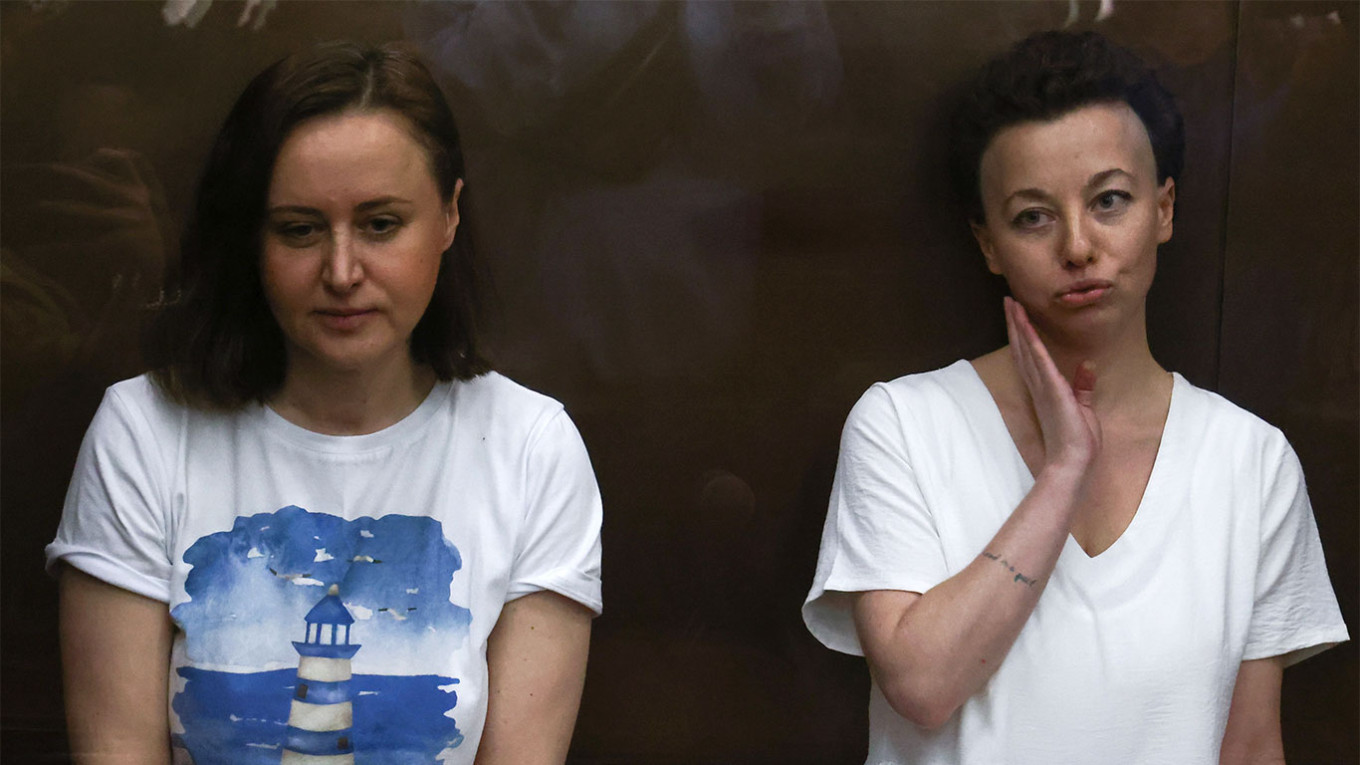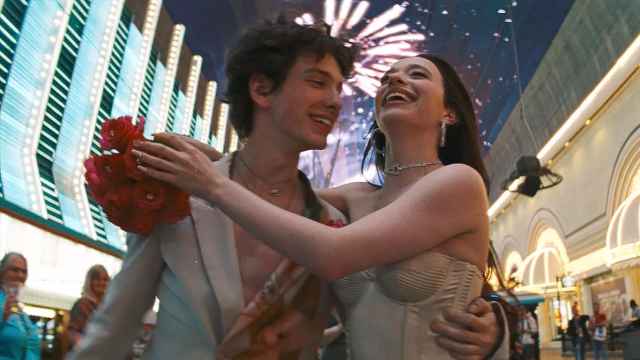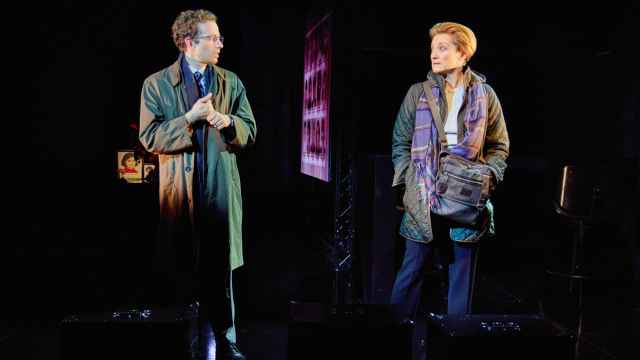Russian theater director Yevgenia Berkovich on Monday spoke out in court against remaining in pre-trial detention. She and playwright Svetlana Petriychuk are under investigation for the charge of “justifying terrorism” for the play “Finist, the Brave Falcon.” The charge is punishable by up to seven years in prison.
Yevgenia Berkovich: My opinion about this motion is simple. I believe that extending it and keeping me in custody is unjust, wrong, and should not be done... Your Honor, I am involved with theater and it is customary for us to rehearse. I rehearsed a light, witty speech for a long time, but I saw my family for the first time in two months and realized that there is nothing light or witty here. I will speak emotionally, but briefly...
We are in the preliminary investigation phase. What is an investigation? There has probably been some kind of crime committed, and there is something not established, something mysterious. As God is my witness, in two months I haven’t been able to figure out what's so mysterious and unknown about this incredible case, leave alone the fact that I'm absolutely certain no crime was committed.
An unidentified person wrote a play. Shakespeare wrote many plays and there is controversy about them, too. Here an identified person — Svetlana Petriychuk — wrote a play on an incredibly relevant topic. In 2016-2017, there was a TV series about women being recruited to ISIS in the Russian Federation. This was discussed on the national state channels in the context of the fight against and prevention of terrorism. This is a major topic for both government agencies and ordinary citizens. I've been hearing about this topic for the last 20 years... I have two daughters, one is 17, the other is 19. This is something I care about.
In the play there is one point that is clear, understandable and important — there is unambiguous evil. It’s terrorism. There are real women, all kinds of women, who go to Syria for all kinds of reasons. Sometimes they die there, sometimes they kill someone, sometimes not. Or they come back here and go to prison. On the one hand that’s fair, but on the other hand, there is no preventive work done with them. Do we have to put these women in jail? Yes, often we do. Do we have any guarantee that they won’t get out and continue? There is no such guarantee.
In the play, the court trial is not shown very sympathetically, but, Your Honor, a trial is different from a children’s play in kindergarten in Russia and around the world. It would be strange if the trial was shown as very sweet and gentle.
There is one thought, one and only thought: this happens, evil happens, crime happens. Complicity in crime, unfortunately, also happens. It's impossible to talk about it without talking about it. It's impossible to show the women who were recruited — many of whom didn't go anywhere, in fact, they didn't even try, but they aren’t on trial now, Svetlana and I are — and yet not talk about them and show them.
I will say one thing about the wonderful expert assessment, because to be honest, it's not the most pleasant topic of conversation. The thing is, there’s nothing in my case. Nothing at all! Literally nothing! Except for the interrogation of two witnesses, both of whom said that there was a beautiful play and that everything about the play was fine.
So that you understand, in this most remarkable expert assessment we are charged with two things. A gesture like this [Berkovich points her index finger upwards]. There are a lot of gestures, and one of them is like this. I'm not exaggerating. Because this is a gesture used by militants of the Islamic State… And the second thing we are charged with is instructions on how to put on a hijab. The instructions are: put the scarf on your head, open your mouth, tie the ends under your chin. Well, the instruction for wearing a headscarf in the Orthodox Church is about the same. I'm quoting verbatim.
On May 4 we were confronted with this extensive investigation into this inhumanly complicated and convoluted case. We woke up and didn’t even have time for coffee. And since then, for two months, we’ve been in jail — well, pre-trial detention — but it’s jail. The duty officer says, "Berkovich, don't turn my prison into a kindergarten." Yesterday he said it for some reason. To be honest, I would like it to be a kindergarten, but it doesn’t change. Nothing has happened in two months. As one great Russian writer said, for every outrage there must be some decency. In this case not a single new document has appeared with which we could somehow familiarize ourselves, except for the mysterious interrogation of a man…who had nothing to do with this project, does not have and has never had anything to do with it. We know this person and we know that he has nothing to do with this project. That's it, nothing more, not one piece of paper, not one document.
I don't want to discuss the “destructological” expertise anymore. I am an (unintelligible) old and experienced stage director, and I staged my first play when there was no “destructology” in my life. And it just can't be like this, it can't be like this — nothing happening for two months. We didn't talk to the investigator even once, not a single piece of paper was added. In my profession, I can't imagine inviting an audience to a theater, even for free, to a show for moms and dads, with no sets, and a food stand closed for repairs, and on stage there’s a stagehand named Vasya who tells about a story of Romeo who loved Juliet and something happened to them. Because that's my job, I'm a director... Generally speaking, I've always assumed that an investigator's job is to investigate. I don’t understand what is being investigated, I don’t understand what the crime is, and I don’t understand the secrets and mysteries of this crime either. That’s all I have to say about our case, and now I’ll speak quickly so that I don’t cry.
In the meantime, we have been in prison for two months. I have two children on the outside, one is a minor, the other is an adult with fairly serious mental health problems. I adopted both girls... Your Honor, please to look at the expert assessment that we attached. I'd like to ask my defense attorney to read a little bit of it, because it's important.
Judge: I understand, thank you. If you feel the need to add anything further...
Yes, I'll say two words and then I'll stop…I keep saying… I keep saying that I want to be released completely because that is the just and merciful and safe thing to do. Now I’m a mother, not a director. I have to be at home – I will stay at home! Over the course of two months, the investigator, sir, you could have come up with just one justification — just for the sake of appearance — for not changing the pre-trial restrictions for the… stringent restriction of confining me to my home. Not using Facebook is torture in this case, but that's okay, I’ve gotten used to it in two months. Just being able to hug my children who are literally going crazy. Who are in danger, despite the fact that they have a wonderful stepfather, they have a wonderful family, relatives, and so on…
For four years we have been working with them so that they wouldn’t cry at night, so that they wouldn’t scream that their Mom would disappear, that they would put Mom in jail. They know what happens when Mom is in jail. They've spent most of their lives in an orphanage. They know that if a child’s Mom is in jail, Mom is not coming back and you stay in an orphanage. This can’t be! Because what’s happening is against the law. That’s all I have to say. Thank you.
Despite guarantees from the actor Oleg Menshikov, director Alexei Borodin, Satirikon theater artistic director Konstantin Raikin, journalist Ksenia Sobchak, children’s aid organization founder Lidia Moniava and head of hospice care Nyuta Federmesser on behalf of Berkovich and Petriychuk, the judge ruled to extend the two women's detention until Sept. 10.
A Message from The Moscow Times:
Dear readers,
We are facing unprecedented challenges. Russia's Prosecutor General's Office has designated The Moscow Times as an "undesirable" organization, criminalizing our work and putting our staff at risk of prosecution. This follows our earlier unjust labeling as a "foreign agent."
These actions are direct attempts to silence independent journalism in Russia. The authorities claim our work "discredits the decisions of the Russian leadership." We see things differently: we strive to provide accurate, unbiased reporting on Russia.
We, the journalists of The Moscow Times, refuse to be silenced. But to continue our work, we need your help.
Your support, no matter how small, makes a world of difference. If you can, please support us monthly starting from just $2. It's quick to set up, and every contribution makes a significant impact.
By supporting The Moscow Times, you're defending open, independent journalism in the face of repression. Thank you for standing with us.
Remind me later.






